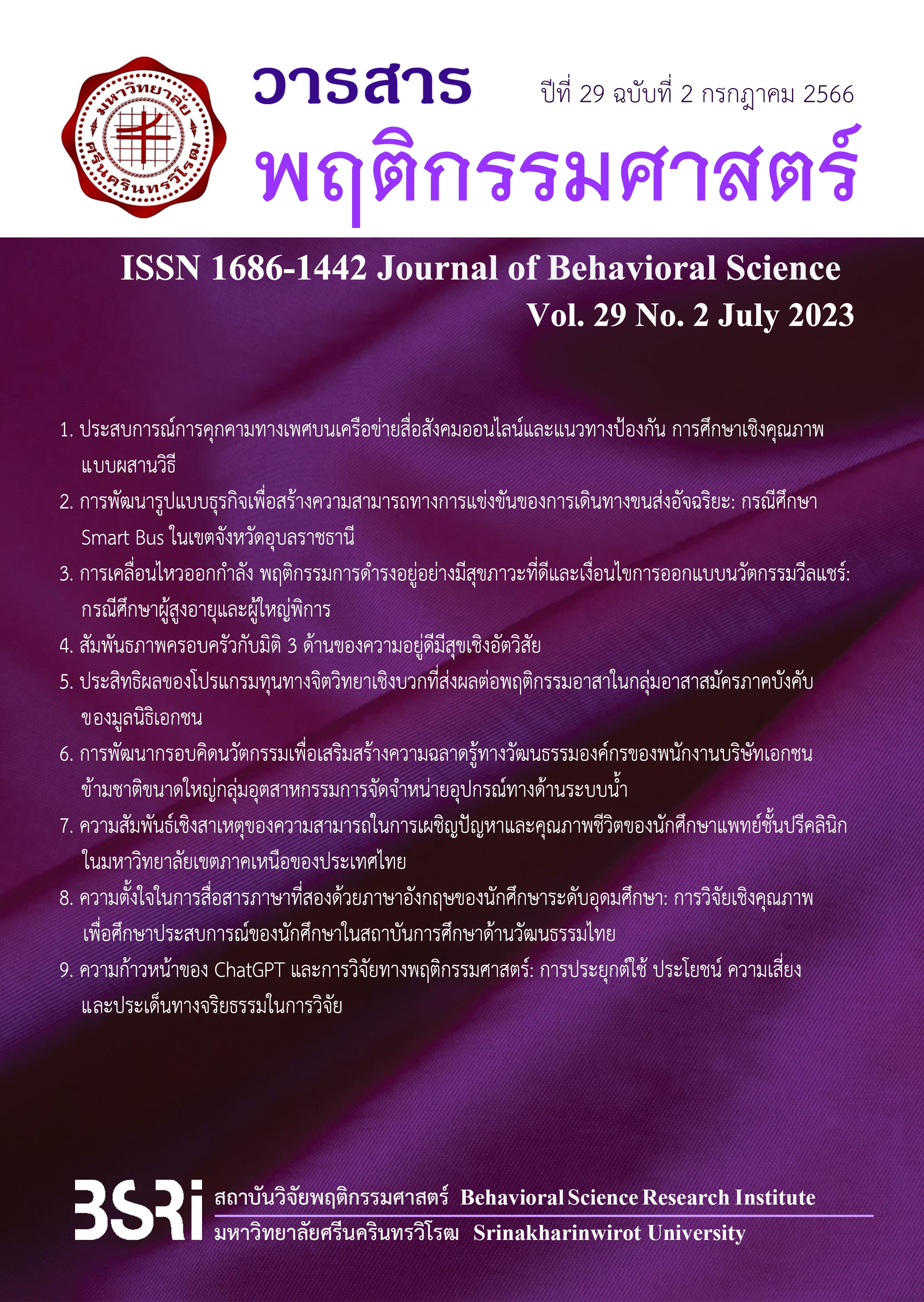Family Relationships and the Three Dimensions of Subjective Wellbeing
Keywords:
Family relationship, subjective wellbeing, life evaluationAbstract
The objective of this research is to analyze the relationship between family relationship and subjective wellbeing of Thai people, which is divided into three dimensions: life evaluation, positive affect, and negative affect. Additionally, the research aims to analyze other factors that are related with the subjective well-being. The analysis utilized data from the 2018 Social and Cultural Situation Survey conducted by the National Statistical Office, with a total sample of 10,934 individuals aged 15 years and above. The results of the ordered probit regression model indicate that a good family relationship can significantly explain subjective well-being in all three dimensions. Respondents who reported high levels of love and attachment to their families were more likely to have high levels of life satisfaction and positive affect, and less likely to have negative affect compared to those who reported low levels of family warmth. This study reflects that a warm family relationship has a significant relationship with the subjective wellbeing of Thai people in both short-term dimensions (measured by positive and negative emotions), and long-term dimensions (measured by life evaluation). Therefore, if the goal of public policy is to increase the happiness of Thai people, public or private policies that promote family cohesion or relationship, should be considered an important priority for Thailand.
Downloads
References
Chandoevwit, W., & Suriyanrattakorn, S. (2022). Economics of Happiness. Log in Design Work.
Chantranapaporn, P., & Wongkumsin, T. (2020). Family Relationship, Life Satisfaction and Spiritual Well-being among the Elderly of the Senior Club at Klong Sam Wa Public Health Center. The Journal of Pacific Institute of Management Science, 6(2), 177-186.
Chen, W., Niu, G. F., Zhang, D. J., Fan, C. Y., Tian, Y., & Zhou, Z. K. (2016). Socioeconomic status and life satisfaction in Chinese adolescents: Analysis of self-esteem as a mediator and optimism as a moderator. Personality and Individual Differences, 95, 105–109. https://doi.org/10.1016/J.PAID.2016.01.036
Clark, A. E. (2018). Four Decades of the Economics of Happiness: Where Next? Review of Income and Wealth, 64(2), 245–269.
Clark, A. E., Frijters, P., & Shields M. A. (2008). Relative Income, Happiness, and Utility: An Explanation for the Easterlin Paradox and Other Puzzles. Journal of Economic Literature, 46(1), 95-144.
Dolan, P., & Metcalfe, R. (2012). Measuring Subjective Wellbeing: Recommendations on Measures for use by National Governments. Cambridge University Press.
Haerpfer, C., Inglehart, R., Moreno, A., Welzel, C., Kizilova, K., Diez-Medrano J., Lagos, M., Norris, P., Ponarin, E. & Puranen, B. (2020). World Values Survey: Round Seven – Country-Pooled Datafile. https://doi.org/10.14281/18241.1
Hair, J. F. Jr., Anderson, R. E., Tatham, R. L., & Black, W. C. (1995). Multivariate Data Analysis (3rd ed.). Macmillan.
Helliwell, J. F., Layard, R., Sachs, J. D., De Neve, J.-E., Aknin, L. B., & Wang, S. (2022). World Happiness Report 2022. Sustainable Development Solutions Network.
Helliwell, J. F., & Putnam, R. D. (2004). The social context of well-being. Philosophical transactions of the Royal Society of London, 359(1449), 1435–1446.
Institute for Social and Economic Research. (2018). British Household Panel Survey: Waves 1-18, 1991-2009. http://doi.org/10.5255/UKDA-SN-5151-2
Kamp Dush, C. M., & Amato, P. R. (2005). Consequences of relationship status and quality for subjective well-being. Journal of Social and Personal Relationships, 22(5), 607–627.
Kashdan, T. B. (2004). The assessment of subjective well-being (issues raised by the Oxford Happiness Questionnaire). Personality and Individual Differences, 36(5), 1225–1232.
Malathum, P., Khongiam, J., & Intarasombat, P. (2009). Relationships of Family Support and Friend Support to Life Satisfaction of Older Adults in Rural Areas. Rama Nurs J, 15(3), 431-448.
New Zealand Government. (2022). Wellbeing Budget 2022: A Secure Future. https://www.treasury.govt.nz/sites/default/files/2022-05/b22-wellbeing-budget.pdf
OECD (2001). The Well-Being of Nations: The Role of Human and Social Capital. OECD Publications.
OECD. (2013). OECD Guidelines on Measuring Subjective Well-being. OECD Publishing. https://doi.org/10.1787/9789264191655-en.
Office for National Statistics. (2020). Optimism and personal well-being: Technical report. https://www.ons.gov.uk/peoplepopulationandcommunity/wellbeing/methodologies/optimismandpersonalwellbeingtechnicalreport
Oswald, A. J., Proto, E. & Sgroi, D. (2015) Happiness and productivity. Journal of Labor Economics, 33 (4). 789-822.
Polenick, C. A., Fredman, S. J., Birditt, K. S., Zarit, S. H., (2018). Relationship Quality with Parents: Implications for Own and Partner Well-Being in Middle-Aged Couples. Family Process, 57(1), 253–268. http://doi.org/10.1111/famp.12275
Suriyanrattakorn, S. (2022). How Much Does Social Capital Contribute to Subjective Well-being of Thai People? Development Economic Review, 16(1), 54-74.
Schupp, J. D. (2012). Sozio-oekonomische Panel (SOEP). Bundesgesundheitsbl, 55, 767–774. https://doi.org/10.1007/s00103-012-1496-1
Unicef. (2020). Family friendly policy. https://www.unicef.org/thailand/media/5791/file/Family-Friendly%20Policies:%20Handbook%20for%20Business.pdf
Downloads
Published
How to Cite
Issue
Section
License
Copyright (c) 2023 Warasan Phuettikammasat

This work is licensed under a Creative Commons Attribution-NonCommercial-NoDerivatives 4.0 International License.
Behavioral Science Research Institute, SWU
114 Sukhumvit 23, Bangkok 10110, Thailand.
Tel.02-649-5000 # 17600



